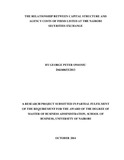| dc.description.abstract | Under agency theory, organizations incur agency costs as a means to reduce agency
conflicts between shareholders (principal) and the managers (agents). The divergent views
by different researchers especially from outside Africa in respect to agency costs, create a
knowledge gap to determine to what extent capital structure affects the agency costs of
companies listed at NSE given Kenya’s uniqueness in terms of culture, laws and
regulations. Some of the studies carried so far in this field gives conflicting outcomes as to
the effect of capital structure on agency costs. The objective of the study was to investigate
the relationship between capital structure and agency cost of listed companies at the
Nairobi Securities Exchange. The following research question guided the study: how does
capital structure relate to agency costs of listed firms? In answering this question, the study
used efficiency cost ratio as a proxy for agency costs, Long term debt to equity as a proxy
for capital structure and two other variables that affects agency costs; this are information
asymmetry as measured by market value/Book value per share and ownership
concentration measured by corporate ownership/Equity. The historical data for these were
obtained from the Nairobi Securities Exchange and the Capital Markets Authority data
banks. The correlation research design was used in the study. The study covered a target
population of all companies quoted at Nairobi Securities Exchange between 1st January
2009 and 30th December 2013. The study used secondary data from Nairobi Security
Exchange. Statistical Package for Social Scientist (SPSS) was used to aid in analyzing
data. Regression analysis was applied to determine the effect of capital structure on agency
costs. A simple regression was used to test the main model and t-test was used as a test of
significance. The key findings revealed that there was a positive correlation between
capital structure and agency costs. The main conclusion from our analysis is that indeed
capital structure determines agency costs. Given the evidence from this research, it’s
evident that capital structure positively affects agency costs of listed firms at the Nairobi
Securities Exchange. Some of the policy recommendations of the study are; Firms should
formulate incentive schemes for managers who are able to reduce agency costs with an
increase or decrease in the use of debt in the firm’s capital structure. Also looking forward,
identifying and the use of appropriate and more unified estimation techniques will be most
welcome, the reason why there is no consensus in the literature about the shape of the
capital structure-agency costs relationship, is because there is no universal estimation
technique, this study serves as a first attempt towards establishing a more pragmatic
empirical model for agency cost modeling and its determinants. | en_US |

